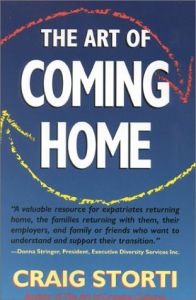Join getAbstract to access the summary!

Join getAbstract to access the summary!
Craig Storti
The Art of Coming Home
Intercultural Press, 2001
What's inside?
Returning home from an overseas work assignment is great; it’s learning to live back home again that’s tough.
Recommendation
If you spent months in Paraguay or Latvia longing for modern supermarkets, octo-plex movie theaters and mega-malls, coming home will surprise you. All that consumerism, all those different breakfast cereals, all that plenty and pizzazz may not play as well with you as you had remembered. Never mind. Eventually you’ll again expect to be offered 15 different kinds of herbal tea with your $18 lunch, but when you first return and the deprivations of your overseas station are still fresh, reentry can include a big shot of culture shock. Companies pay plenty of attention to executives and workers who need help and advice when they’re given an overseas assignment. But Craig Storti thought it was time to address the needs of those same expats when they return and face the challenge of readjustment. He does so expertly in this practical guide, which includes hard logistics and some soft psychology. getAbstract.com highly recommends this book to homecoming expats and to those who play crucial roles in managing their reentries.
Summary
About the Author
Craig Storti is founder and director of Communicating Across Cultures, a Washington D.C.-based international communication training and consulting firm that designs and delivers seminars on cross-cultural adjustment and repatriation. A former Peace Corps volunteer, he is the author of several books including The Art of Crossing Cultures and Figuring Foreigners Out. Storti is a veteran in the field of crossing cultures and a media spokesperson on issues of intercultural relations.



















Comment on this summary